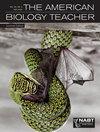American Genesis: The Evolution Controversies from Scopes to Creation Science
IF 0.3
4区 教育学
Q4 BIOLOGY
引用次数: 11
Abstract
Transformations: Approaches to College Science Teaching. By Deborah Allen and Kimberly D. Tanner. 2009. W.H. Freeman. (ISBN 9781429253352). 284 pp. Cloth. $21.95. Can we model scientific practice better through conscientious course design and lecture strategies? Transformations is an up-to-date source book that addresses this question with teaching ideas drawn from the primary literature of the scholarship of teaching and learning (SoTL) and accumulated teacher lore in biology. This book starts from the uncontroversial premise that more active-learning approaches will promote learning in biology courses, but extends this premise toward course engagement and self-reflection about how we interact with our students. The authors have reprinted a series of features they published in CBE--Life Sciences Education. These features, arranged thematically, are intended to be used as independent segments for faculty who want to tool up on particular topics or practices. The volume opens with seven techniques for boosting active learning in lectures, briefly introduced in order of increasing prep time for the instructor. Several of these techniques--especially problem-based learning (PBL), peer-teaching, and cooperative learning--are elaborated upon in later chapters. The second group of chapters outlines ideas about course design, assessment, and content standards, and the reader is directed to more in-depth sources on those topics. For me, some of the most interesting ideas were from the section about student engagement, particularly the chapters about developing cultural competence as well as the practice of framing scientific content with historical or cultural perspectives in order to engage students. Their discussion of cultural competency offered starting points for faculty to self-reflect about our attitudes when working with students whose backgrounds differ from our own. Some of the practices introduced there may stop students from underrepresented groups from switching away from science because they don't see themselves as belonging to the scientific culture. The final chapters emphasize teaching scientists' ongoing development in scientific education. Many of these ideas are attainable by a single faculty member, such as exploring the literature of SoTL or developing partnerships with teachers in P-12 settings. Some chapters are more polemical in nature, particularly in regard to developing the teaching skills of biology graduate students as a systematic element of their training. Surprisingly, offices of teaching and learning that are dedicated to faculty development get no mention in this section. …美国创世纪:从范围到创造科学的进化论争议
转变:大学科学教学的方法。黛博拉·艾伦和金伯利·d·坦纳著,2009。w·h·弗里曼。(ISBN 9781429253352)。284页。布。21.95美元。我们能否通过认真的课程设计和讲课策略更好地为科学实践建模?转换是一个最新的源书,解决了这个问题的教学理念,从教学和学习(SoTL)的奖学金的主要文献和积累的教师爱在生物学。这本书从一个毋庸置疑的前提开始,即更积极的学习方法将促进生物学课程的学习,但将这一前提扩展到课程参与和自我反思,即我们如何与学生互动。作者已经转载了他们在CBE上发表的一系列特写——生命科学教育。这些专题,按主题排列,旨在作为教师想要在特定主题或实践工具的独立部分使用。卷打开七个技术,促进积极学习的讲座,简要介绍,以增加准备时间的讲师。其中一些技术——尤其是基于问题的学习(PBL)、同伴教学和合作学习——将在后面的章节中详细阐述。第二组章节概述了关于课程设计,评估和内容标准的想法,读者被引导到这些主题的更深入的资源。对我来说,一些最有趣的想法来自关于学生参与的部分,特别是关于发展文化能力的章节,以及用历史或文化视角构建科学内容的实践,以吸引学生。他们对文化能力的讨论为教师提供了一个起点,让他们反思自己在与背景与自己不同的学生打交道时的态度。这里引入的一些做法可能会阻止来自代表性不足群体的学生放弃科学,因为他们不认为自己属于科学文化。最后几章强调了科学教育中教学科学家的持续发展。其中许多想法可以由单个教师实现,例如探索SoTL的文献或与P-12设置的教师建立伙伴关系。有些章节在本质上更具争议性,特别是关于将培养生物学研究生的教学技能作为其训练的系统要素。令人惊讶的是,致力于教师发展的教学办公室在本节中没有被提及。…
本文章由计算机程序翻译,如有差异,请以英文原文为准。
求助全文
约1分钟内获得全文
求助全文
来源期刊

American Biology Teacher
BIOLOGY-EDUCATION, SCIENTIFIC DISCIPLINES
CiteScore
0.80
自引率
20.00%
发文量
108
期刊介绍:
The American Biology Teacher is an award winning and peer-refereed professional journal for K-16 biology teachers. Articles include topics such as modern biology content, biology teaching strategies for both the classroom and laboratory, field activities, and a wide range of assistance for application and professional development. Each issue features reviews of books, classroom technology products, and "Biology Today." Published 9 times a year, the journal also covers the social and ethical implications of biology and ways to incorporate such concerns into instructional programs.
 求助内容:
求助内容: 应助结果提醒方式:
应助结果提醒方式:


